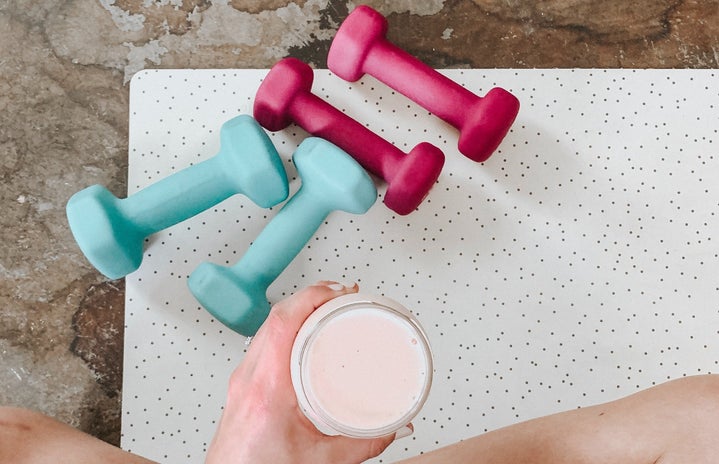Hypermasculine gym bros. God-like abs. An overwhelming amount of calories. When talking about protein powder, it’s likely that these stereotypes come to mind. No wonder so many people find venturing into this supplement so daunting.
Surprisingly, protein powder is not the enemy. Be it losing or gaining weight, it can be a vital component of your diet to help you reach your goals. These powders come in a variety of flavors and can be plant-based, lactose-free and low-calorie. This makes them easy to incorporate into any diet and can be customised to fit your goals.
The most important step is knowing where to start. In this article, we will discuss the basics of protein powder, discover how much you need to reach your goals, distinguish the differences between different types of protein powders and so much more!
What is protein powder?
Protein powders are powdered forms of protein isolated from plants, eggs or milk. Often, these proteins are combined with artificial flavoring, sweeteners, vitamins and minerals. These powders are a popular nutritional supplement often utilized by athletes, weightlifters and martial artists as they help to increase lean body mass. There are many different protein powders, the most common being whey, casein and soy.
Types of protein powder
Animal-based protein
Whey protein – Whey is the liquid that separates from milk curds during the cheese-making process. This protein is fast-absorbing and safe for most people to use but can be high in lactose, a sugar in milk that many people have difficulty digesting. Whey is an excellent source of protein for those looking to gain weight, as it increases muscle growth and boosts recovery.
Casein protein – Casein is also a milk protein but absorbs much more slowly than whey, and this results in the more gradual release of amino acids, preventing muscle breakdown. Casein is an excellent choice for those looking to slim down and tone up, as it slowly builds muscle mass while supporting fat loss.
Egg protein – Eggs are a wonderful source of high-quality protein, and these proteins are also much more easily digested than those in milk. Egg protein powder contains all nine amino acids and is beneficial for lean muscle growth and appetite reduction.
Plant-based protein
Soy protein – Soy protein is isolated from soybeans, a popular alternative to animal protein. There are many benefits to soy protein, as it is a complete protein containing all the essential amino acids that cannot be synthesized by our bodies and need to be obtained through our diet. However, scientific studies suggest that soy did not perform as well as whey protein in synthesizing protein for muscle.
Hemp protein – Hemp protein is increasing in popularity, and although it is related to marijuana, this protein contains only trace amounts of the psychoactive ingredient, THC. This protein is rich in omega-3 fatty acids and amino acids that gradually build muscle and are easily digestible.
Pea protein – Pea protein is isolated from yellow split peas, rich in almost all amino acids and high in fiber. One particular benefit is that this protein is high in BCAAs (branched-chain amino acids), strengthening muscle and boosting fullness hormones.
Brown Rice Protein – Brown rice protein contains high levels of almost all amino acids. Furthermore, it helps to promote fullness, increase muscle mass and speed up recovery. Many studies have shown that brown rice protein is comparable to whey protein regarding changes in body composition over the same period. However, more research on brown rice protein is needed.
Why is protein powder used?
Typically, protein powders are used when someone wants to include more protein in their diet. Some reasons they may require more protein are:
Because they are growing – Growing people, particularly teenagers, require more protein to fuel their bodies because they are still growing and changing.
Because they are recovering from an injury – Protein aids growth and repair, so it is essential to boost protein when healing wounds.
Because they are trying a new workout – If someone is new to working out, they will require more protein than they typically would build more muscle. Furthermore, if someone who is used to working out increases the intensity of their exercise, they will require increased protein to maintain their muscle mass.
Because they are vegan or vegetarian – Those following a plant-based diet often eliminate several vital protein sources from their diet, such as meat, fish, eggs and dairy products. They need to ensure they are getting a suitable amount of protein in their diet, which protein powder can help supplement.
How much protein do i need?
You can easily calculate your required protein intake with some simple math. Based upon one’s protein intake for a single day:
- The typical adult requires 0.8 grams of protein per kilogram of body weight.
- Recreational athletes require 1.1 to 1.4 grams of protein per kilogram of body weight.
- Competitive athletes require 1.2 to 1.4 grams of protein per kilogram of body weight.
- Competitive athletes participating in ultra-endurance sports require up to 2 grams of protein per kilogram of body weight.
- Athletes building muscle mass require 1.5 to 2 grams of protein per kilogram of body weight
Once you have deciphered which category you fall into, simple multiplication will do the rest. For example, a 64kg (141lbs) woman who plays recreational soccer would require between 70.4 and 89.6 grams of protein per day.
how to use protein powder
Protein powder is convenient and straightforward to use. Generally, these powders come in a variety of flavors, making them perfect for making protein shakes. Combine a scoop of the powder with milk or water and combine! However, these powders can also be incorporated into smoothies and other foods to increase protein intake. Here are some of our favorite high-protein recipes that use protein powder:
- Peanut Butter Protein Cookies
- Cozy Cinnamon Protein Oats
- The Ultimate One Minute Protein Brownie
- The Best Protein Pancakes
- Chocolate Protein Overnight Oats
Where to buy protein powder
Of course which brand and type of protein powder you choose to buy is dependent on your goals and dietary requirements. Here is a short list of some of the best on the market, whatever your preference may be.
- Best for gaining weight – Orgain Sport Protein Organic Plant Based Powder
- Best for losing weight – Protein World The Slender Blend
- Best plant-based – Protein World The Vegan Blend
- Best lactose-free – Myprotein Soy Protein Isolate
- Best keto – Orgain Keto Collagen Protein Powder
- Best flavor – Myprotein Impact Whey Isolate
- Best personalised – Gainful Personalized Protein Powder


